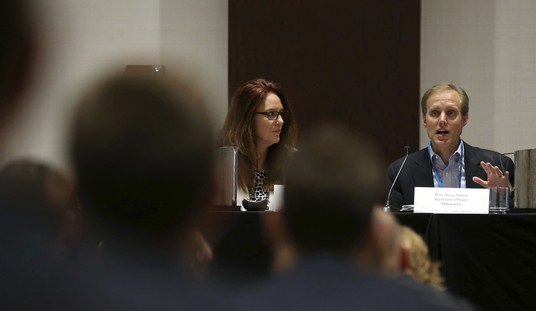Has Facebook gotten too big, both as a company and as a political target, for its founder to manage? A group of Facebook investors has banded together to make that argument and to strip Mark Zuckerberg of some or all of his power at the platform he created. Vanity Fair follows up on a Business Insider scoop (behind a paywall) about a potential palace coup … or at the very least a brutal unfriending:
“I think life is about learning from the mistakes, and figuring out what you need to do to move forward,” [said Zuckerberg in April]. “The reality of a lot of this is when you’re building something, like Facebook, that is unprecedented in the world, there are going to be things that you mess up.” But, he said, he wouldn’t be going anywhere—“I started this place. I run it. I am responsible for what happens here,” he said. When asked whether Facebook’s board of directors had discussed replacing him as chairman, he gave only a terse reply: “Not that I’m aware of.”
That the subject of Zuckerberg stepping down as chairman was broached in the first place suggested that, for the first time, his ability to steer the company he’d created was in doubt. Some shareholders apparently thought so, too: in April, shortly after the call with reporters, an activist-investor group called for Zuckerberg to relinquish “one, if not both, [of his] titles” at Facebook, saying in a statement that “he doesn’t understand how a large, global, and publicly held company is run.” The group, Open Mic, holds no shares in the company, but its call has now been echoed by a group of investors holding nearly $3 billion in Facebook shares, which has grown increasingly restless about Facebook’s corporate governance.
Business Insider reports that a group of six shareholders that has seen Facebook become enmeshed in a number of scandals, including 2016 election interference and the Cambridge Analytica incident, is agitating for change at Facebook, starting with removing Zuckerberg from his chairman position and replacing him with an independent executive. The shareholders also want to do away with Facebook’s dual-class share structure, which they believe gives too much power to Zuckerberg and his team of executives. Facebook stock is classified into two types, Class A and Class B—and Zuckerberg owns 75 percent of Class B shares, which have 10 times the voting power of Class A shares. “When you open yourself up to more opinions, more independent voices, you’re more likely to make better decisions. It’s more likely that someone with independent governance would have spoken up about some of these things,” Illinois State Treasurer Michael Frerichs, who has $35 million invested in Facebook, told Business Insider.
Perhaps “unfriend” isn’t a strong enough term. According to a New York state official overseeing their billion-dollar investment in the platform, Zuckerberg is akin to a “robber baron” or “dictator”:
Patrick Doherty, the director of corporate governance at the office of the New York comptroller, which oversees more than $1 billion in Facebook stock, slammed the set-up as a dangerous throwback.
‘The idea that there should be an autocrat in charge of a gigantic public company, which has billions of dollars of shareholder money invested in it, is an anachronism,’ Doherty said.
‘It harks back to the 19th century when you had these robber barons who were autocrats and dictators.’
“Robber baron”? Whose natural resources and human capital has Zuckerberg robbed? There’s more than a small amount of irony in this criticism even beyond this hyperbole. Zuckerberg is being called an autocrat by a bureaucrat, and a dictator by an unelected government official that wants more of a role in leading a private-sector firm. Given the results of that kind of blending of power in the 20th century, I’d like to hope that such a model is also an anachronism, and certainly more of an anachronism than the founder of a company having the temerity to retain control of it.
So, is Zuckerberg in trouble, and at risk of getting ejected from his own creation? Only if he chooses to be, the investment analysts at Motley Fool remind readers. The deal that investors made to take part in Facebook leave control of the company in its founder’s hands. The only way to force Zuckerberg out would be to burn the digital village down in order to save it, and that won’t be a good look at all:
Facebook investors should check out the BI report, but the reality of the situation is that Zuckerberg has to voluntarily agree to any outcome that improves Facebook’s corporate governance structure. Remember that early on he scored a then-unprecedented deal with private investors that granted him unparalleled authority and control, a precedent that ended up paving the way for other comparable arrangements.
Activist investors can continue fighting, but without Zuckerberg’s consent, there is literally nothing anyone can do about it. What’s less clear is what could actually jolt Zuckerberg into appreciating the benefits of good corporate governance, as undermining the issue has helped make him one of the wealthiest men in the world.
It’s a Catch-22, since investors’ only recourse is to sell shares in protest. In doing so, they send a message, but also risk missing out on potential gains. Fundamentally, the scandals have only reinforced the advertising business, which will help support the stock price.
The worst-case scenario for investors is that a cratering stock price is the only thing that gets through to Zuck, which would not only jeopardize his personal net worth, but his philanthropic efforts and the legacy he leaves behind for his children. There’s no end in sight for Facebook’s ongoing corporate governance travesties.
They still seem to be making a lot of money for investors, so “travesties” might be too tough a word to use. For now, the answer from Facebook for a palace revolt is a resounding no, as BI discovered:
Facebook pushed back, telling B.I. in a statement, “We believe that our capital structure is in the best interests of our stockholders and that our current corporate governance structure is sound and effective.”
Is there a “pound sand” tag on Facebook? Investors can feel free to vote with their feet, which is a legitimate way to express dissatisfaction with Zuckerberg’s leadership. But the price isn’t going to crater as long as the platform makes money, so it’s a cost-benefit question for investors looking for long-term growth. That more or less assures Zuckerberg will remain in control, for better or worse, of the platform he created.








Join the conversation as a VIP Member